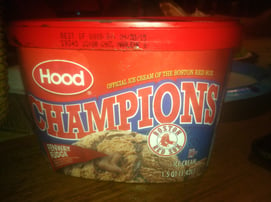Not wishing to rub salt in the wounds of my beleaguered Red Sox, their meteoric rise from last place in 2012 to first place in 2013 and subsequent plummet to the cellar in 2014 underscores the problems with speculative production. Last week, celebrating a birthday, I was offered a dish of “Fenway Fudge” ice cream, and was amused by the container.
 CHAMPIONS?
CHAMPIONS?
Well perhaps the Sox were when the product was made. Or maybe the ice cream (which, by the way is delicious) was made very recently, but dispensed into packaging that was printed in 2012. Maybe a buyer got a good deal on a large print quantity. The specialty packing industry typically likes long runs to amortize pre-prep and set-ups. Or maybe the forecast for the 2014 season augurs another rise from the ashes for the Sox. I don’t follow the team closely, so perhaps someone more in the know has a line on next season.
My guess however is the large quantities of packaging and ice cream were manufactured according to what Shigeo Shingo referred to as “speculative production.” Fenway Fudge, after all, is not the only Red Sox flavor; Green Monster Mint and Grand Slam Vanilla, to name a couple more, also sport the “Champions” banner. So if the ice cream is good, what’s the big deal? Diehard fans still love their Sox even if the packaging is a season behind (or ahead.) The big deal, I think, is about the need to produce packaging and product well before, as Mr. Shingo would say, they are “authorized.” When the time to produce goods and services is much much longer than the customer’s desired lead-time, then we are forced to speculate – roll the dice – in order to schedule our resources. Not every type of manufacturer will be so obviously impacted as one that ties it’s marketing to a baseball team, but seasonality, product proliferation, and customer taste make long runs of any product a gamble. And while not every product will cost as much to store as ice cream (note the use-by date on the Fenway Fudge package is 9/30/15), the need to produce too much or produce too soon squanders resources and increases costs in a way that current cost accounting rules hide as an asset.
One of my favorite Shigeo Shingo quotes is:
“The most dangerous kind of waste is the waste we do not recognize.”
Overproduction’s stealth has been legislated into management accounting and operations policy, and until this is recognized, it will be rationalized as a necessary evil, needed to “hit the numbers.”
Is overproduction really seen as a waste in your business, or is it tacitly accepted? Share a thought.
As for the Sox? Wait for next season. Go Sox.
O.L.D. 
Hey! Our 10th Annual Northeast Lean Conference is next week! October 1 & 2 at the Mass Mutual Center in Springfield, Massachusetts. Over 550 Lean learners from 150 companies have already signed up. Click here to register today to learn, share, and recharge your Lean batteries. Hope to see you there.


